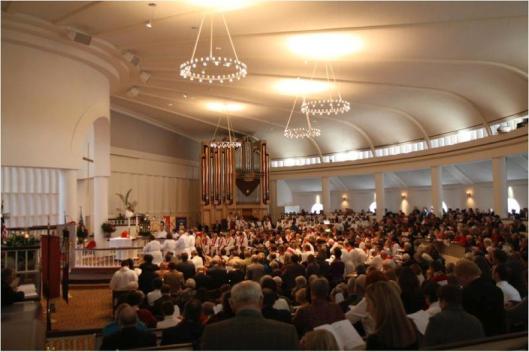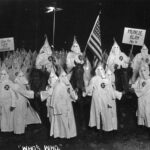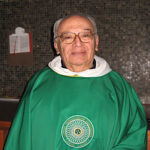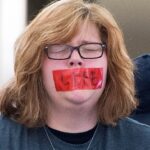
On a Saturday morning earlier this month a gathering of 900 supporters from across the Episcopal Diocese of Virginia crowded into the main sanctuary of the Falls Church Episcopal (won from departing Anglicans in May through a court verdict). The special service celebrated nine transitional deacons ordained to the Episcopal priesthood by Bishop Shannon Johnston.
The service partly filled the role of using the reclaimed church campus for diocesan purposes (the diocese recently relocated its Northern Virginia office from Goodwin House in Alexandria to the Falls Church.) The service also showed how a diocese that has suffered a significant drop in attendance over the past decade is not lacking for new priests.
Unlike steep declines in membership, finances, and number of parishes that have negatively impacted the life of the Episcopal Church, the denomination has seen a more gradual decline in priests, maintaining – in some areas like Virginia and Texas — more than enough to meet its needs. While rural congregations do struggle to attract or support full-time paid clergy, an overall ample supply of priests is surprising, given that a recent report on the state of the clergy in the Episcopal denomination identified a 26 percent drop in ordinations over the past six years.
The Roman Catholic Church, in contrast, has faced a sharp decline in vocations for much longer. It would be tempting to link the Episcopal clergy abundance to a larger pool from which to draw: the Episcopal Church does not require its clergy to practice the discipline of celibacy, opening the priesthood to more men. But the number of new male priests has actually dropped by over half since the early 1970s. Probably a more likely explanation for surplus priests is that women and – increasingly – openly gay candidates for the priesthood are either commonplace or swiftly becoming so.
All of the Episcopal Church’s 11 accredited seminaries enroll women, and many have had majority-female graduating classes for years, often filled with second career aspiring clergy (the average age of Episcopal priests has steadily increased every year, with the typical woman ordained now in her 50s). As for gay clergy, some liberal dioceses of the church have openly ordained them since the mid-1980s, and once-moderate dioceses like Virginia have even begun doing so (the December ordination service at the Falls Church included one openly lesbian priest, Jo Belser, who is the first openly homosexual candidate to be ordained by the diocese).
The average age at ordination is now 44 (up from the early 30s in 1970) and the average age of active Episcopal clergy is 58.
In 2011, the neighboring Episcopal Diocese of Washington temporarily suspended the diocesan discernment process for those seeking ordination, citing an overabundance of priests. In January of 2012, Bishop Maryann Budde extended the suspension through December 2012 “and longer, if necessary.”
“Given the number of relatively healthy congregations and the appeal of our location, the Diocese of Washington has far more people interested in pursuing ordination than can reasonably hope to find employment in the Church,” Budde wrote in January 2012. “There are currently almost 30 people in the ordination process, a number that well surpasses the diocese’s current need for clergy for traditional parish positions. In addition, there is a significant number of unemployed and underemployed priests in the diocese who are seeking to be called to stipendiary ministries.”
To date, the diocese has not announced plans to resume discernment for ordination.
Even with declining numbers of new ordinations nationally and a corresponding increase in the average age of active Episcopal clergy, fears from 10-15 years ago that the church would suffer a clergy shortage seem unfounded. The overall decline in Episcopal Church attendance (down 23 percent in the past decade) has, quite simply, reduced a need for new priests. As Bishop Budde candidly wrote in her letter explaining discernment suspension: “A Roman Catholic colleague once asked me if the Episcopal Church was also experiencing a clergy shortage. ‘No,’ I said. ‘What we have is a shortage of lay people.’”




Comment by Ray Bannister on December 27, 2012 at 4:53 pm
Forgive me for generalizing, but I know a few of the “mid-life crisis” Episcopal priests, men and women who burned out in their secular jobs because they couldn’t handle the stress, or they got divorced, decided they were gay, etc. I’m sure some of these people are good and faithful servants of God. But I’m also sure some of them are using the church as a paid vacation from life, trying to “find themselves,” network with more gays and lesbians, get themselves ordained so as to feel good about their lifestyles, or some combination of the above. The Episcopalians may well have a surplus of clergy, but the question is: High-quality, God-motivated servants of God, or neurotic middle-aged narcissists who spend half their day writing in their journals or hooking up online?
It’s hard to find any good way to “spin” the story of a church that loses laity but has a clergy surplus.
Comment by jeffreywalton on December 27, 2012 at 5:11 pm
That’s exactly right, Ray. Sometimes we see former high profile state governors embroiled in same-sex affairs who magically gain immediate admission to an Episcopal seminary and then use the church for their own ends (glancing in the general direction of New Jersey).
Comment by Tommy Stevens on December 28, 2012 at 10:08 am
Jeffrey – can you provide any example other than New Jersey? You imply that it’s a regular occurrence. It should also be noted that the former Gov. of NJ who enrolled at General did so on his own accord, not with the support of a Bishop or diocese, and was not on an ordination tract. And, in fact, he has not been ordained.
Comment by Doug on December 28, 2012 at 4:33 pm
Don’t count on Mr. Walton to provide much in the way of an example. And of course Ray, above, laughably over generalizes from an alleged experience in order to smear as many Episcopal Priests as possible. Unfortunately, this is what passes as heavy duty statistical analysis and commentary for those supposedly following “the faith once delivered.”
Comment by jeffreywalton on December 28, 2012 at 5:19 pm
Oh, but you can Doug. First, to address NJ, that’s already been previously addressed here: http://spectator.org/archives/2011/04/27/too-messy-even-for-liberals and yes, he did serve on staff at All Saints Hoboken, so don’t feel he can be distanced from the diocese quickly.
As for other examples, there are many, but I’ll spotlight Alberto Cutie (the first priest to be admitted to a diocese via a press conference after a beach blanket romp) and Matthew Fox, the new age priest ejected from the Dominicans and summarily ushered into the Episcopal Diocese of California. In their own ways, each was a scandal and each was fast-tracked to the Episcopal priesthood. More here: http://www.crisismagazine.com/2010/episcopalcatholic-conversion-is-a-two-way-street
All three men had something in common: each represented a potentially promising demographic that the Episcopal Church wished to bring into its pews. Normal vetting went out the window so that TEC could quickly be seen as inclusive and accommodating.
Comment by Ray Bannister on December 28, 2012 at 6:07 pm
Well, I can’t provide links as Jeffrey did, since the priests I’m referring to are not high-profile and I don’t want to risk a libel suit. One of the people above apparently doesn’t think my anecdotal evidence is worth much. Obviously there are no statistics regarding men who enter the priesthood to give them access to teen boys and to a well-established gay network. However, I do think anecdotal evidence should count for something. There are bad apples in all denominations, of course, but what is unprecedented about the Episcs is how they’ve defined deviancy down – join us, dump your wife, move in with another man, we’ll accept you – heck, we’ll make you a bishop. Just in my own metro area I know of at least 3 Episcopal priests with the same story – secular job, marriage, kids, “came out,” divorced, became priests. One was recently arrested in a men’s restroom (fill in the rest), and he’s still a priest, still working with the church’s youth. Not good. He entered a nolo plea, which essentially means “guilty but without the word `guilty’ appearing in the court record.”
Comment by Doug on December 28, 2012 at 7:35 pm
Wow, Mr. Walton! So many examples and so little time. Of course, I’m certain that neither you nor Crisis Magazine (The voice for the faithful catholic laity) would have an ax to grind. You’re saying that each of these three men chose to live their lives as Episcopal Priests in order to use the Church to further their own ends? Which would be what exactly? World domination?
The point is that you have no idea regarding the calling of either of these men nor does Crisis Magazine (The voice for the faithful catholic laity). You mention that Mr. McGreevey is on the staff of All Saints Hoboken as if it’s some sort of mark against him. Mr. McGreevey, I believe, at least in the past, has served as a volunteer in Harlem for Exodus Ministries where he’s helped former prisioners seeking rehabilitation.
And the normal vetting process went out the window? Mr. McGreevey was rejected for the priesthood. Your claim that TEC doesn’t thoroughly vet its candidates for ordination is clueless.
Comment by Stephen Marcus Colmar on April 26, 2017 at 5:15 am
Sexually confused men have always uses the Catholic Church as a hiding place as well as network to locate other gay men.
I don’t think a few mid lifer Episcopal clergyman make for much of a point.
Comment by Tommy Stevens on December 28, 2012 at 8:37 pm
Doug – thank you. I am amused at all of the “I know of someone who…” stories that are expected to be received as factual. And, if someone can’t provide names/information because they’re afraid of libel, it would stand to reason that the information must be false. I have no dog in the McGreevey issue, but it seems that some on this site would prefer the Episcopal church have completely slammed the door him and not welcomed him at all – not talking about as a priest, but as a volunteer member doing important outreach for their faith community. Am I the only one who remembers the old camp song – “And they’ll know we are Christians by our love”? Still laughing about the comment that 70% of the students at GTS at one point all identified as agnostics. Sorry, but the person who wrote those knows it’s an outright lie. I’m pretty sure that’s strongly discouraged somewhere in the Scriptures.
Comment by undergroundpewster on December 27, 2012 at 6:21 pm
Any way you spin it, it still looks like water spiralling down the commode.
Comment by Walt Pryor on December 27, 2012 at 10:22 pm
I have wondered about the fact that many congregations “cannot afford a minister.” This a typical statement from rural communities. Had a District Superintendent say; Yes, having a minister is expensive. That is an abominable statement! It shows what is really important to many Denominations. If I could put together good sermons, I would do it for nothing. It is a privilege, not a way to make money. I think God will say to many, You have received your reward, you were well paid. I think many Denominations, use, or abuse, the people, just to make money. They tell congregations, we do not want politics in our church, but the money goes to support Left Wing Political Agenda’s. Just keep quiet and keep those donations coming in.
Comment by Nail5@gmail.com on December 27, 2012 at 6:19 pm
When I attended General Theological Seminary as a non-degree student, it was apparent that the only qualification for attendance and ordination was a proper social activist focus. Here’s an amazing stat: in a survey of my class, over 70% were agnostics!!!!
Comment by J S Lang on December 28, 2012 at 5:17 pm
That’s disgusting – but not surprising. Since you were a non-degree student, you might not know this, but I’ll ask anyway: To get admitted to GTS, was there anything required but a bachelor’s degree – as in, grade average, letter of reference from a pastor or denomination, anything like that? I have heard that with the lib seminaries, if you’ve got the BA and believe a lot of BS, you’re in.
Comment by Stephen Marcus Colmar on April 26, 2017 at 5:27 am
Is that a bad thing? I’d rather have a church leader focused on good works as opposed to dogma.
Comment by ray on December 28, 2012 at 12:20 pm
Preach a gospel lacking the power to save from sin only appease it and this is the outcome. Too many denominational leaders are preaching that same gutless gospel. God ordains in truth. Bishops ordain in word.
Comment by bob on December 28, 2012 at 5:47 pm
There is also the now retired (and suspended) Bishop of Olympia, Vincent Warner. If you try and check his CV you’ll find not merely no seminary degree, but no undergraduate one either. I think the only actual diploma is highschool plus a couple of fast seminars in between that and ordination. Barbara Harris also has no seminary degree. However, once you look at what they believe you may find that spending three years learning virtually nothing make skipping it a smart move at least financially. One can also see online versions of the general ordination exam that graduates must pass. I was pretty surprised at it. I think with 2 weeks head start I could have passed it while studying biology years ago. Not impressive, neither are the ordinands. A question no one wants to answer would be this: Since there is nothing “wrong” a person can do in ECUSA, why ordain anyone? Why exactly can’t any layman anywhere “do” a eucharist themselves? What would the organization “do” to them? Zero clergy shortage.
Comment by John Morris on December 28, 2012 at 11:54 pm
How does a church that has no doctrine put together an general ordination exam?
Comment by Virginia McDermott Kivel on November 8, 2014 at 10:19 am
Give me a break! ECUSA has a doctrine. Everyone isn’t adhering to it – but it is there. And Bible, BCP, and History, pastoral care are all one it.
Comment by Stephen Marcus Colmar on April 26, 2017 at 5:24 am
The Church allows for divergent opinions regarding both scriptural interpretation as well as pastoral care.
The address this issue on the website main page. I remember reading that the Catholic Church made a point of reconciling scripture with Greek philosophy; the Episcopal Church does the same thing in so far as the issues and prevailing norms of our era.
Comment by zach on December 28, 2012 at 10:51 pm
To Walt.. I’m not episcopalian, but am ordained in another denom. I know many, many part time pastors, most of who would love to be full time. Preaching and putting together a sermon is merely part of the job. Also, a good preacher needs 20 hours to put together an excellent sermon. So a part time pastor has that much less time to do all the other work. In general, full time is better. Not all of course who are full time are worth it. The young guy who comes in, part time, is looking to cast a vision and grow the church to the point where he, she can hire more people all full time, but in the rural environment, this can be a challenge.
Comment by JMR on December 30, 2012 at 5:35 pm
I wonder if the title of this article underscores a CAUSE or an EFFECT? We left the Episcopal Church years ago, because we were just plain tired of being talked down to all the time. I’ve got an MBA, but my wife does not. My wife frequently felt like she was being treated like a child regarding spiritual issues, and frankly so did I. Homilies ALWAYS are written like some kind of missive by the pope (by EVERY ECUSA priest I _ever_ listened to, and there had to be at least half a dozen).
Intelligent, educated people can have very real, very supportable disagreements about the merit of MANY of the of the things that bishops and priests in the ECUSA think are settled articles of faith.
For all you ECUSA priests working on next Sunday’s sermon, let me hit you with a few important stats you might want to consider before putting pen to paper (or fingers to keyboard).
Mean Educational Attainment In the USA
—————————————————-
High School / GED: 87%
Less than 3 years of College: 56%
Bachelor’s Degree: 39%
Masters: 8%
Doctorate or Professional Degree: 3%
So, to help you out, Reverend Professor, if you’re primarily speaking about issues and concerns that only affect people with bachelor’s degrees, or jobs that require bachelor’s degrees, you’ve already lost 61% of your potential congregants. Also, if you’re using flowery language that requires a master’s degree to follow, you’ve lost 92% of your potential congregants. You’re not in seminary any more, and you’re not impressing anybody by talking down to us (Or, conversely, by subconsciously associating someone’s traditional perspectives with lower education levels.)
We became Methodists years ago, and haven’t regretted it one bit. Our pastor is a great, caring person, who earnestly works hard to GROW his church by connecting people and unashamedly preaching the GOSPEL — not trying to explain it away. He’s not a “conservative”, but he most certainly is an evangelical. Liberality and conservatism have nothing to do with the gospel. That’s where you folks went off the track I think. In your minds you equate conservative with pharisee and liberal with Jesus. Wrong.
ECUSA, you’re losing your congregations because you have nothing to offer them any more. Nobody’s buying the intellectual snobbery you’re selling these days — it went out in the 70s with elbow patches on your professor’s sport coat. Today you need to help us connect with friends and neighbors so that we can work together to do God’s work — in a quiet, relentless, inspiring way.
Comment by JMR on December 30, 2012 at 5:39 pm
…couple of minor corrections… should have said “56%” not “61%” for potential congregants…. also… forgot that ECUSA priests like to call their sermons “homilies”… more pretention I guess…
Comment by JMR on December 30, 2012 at 5:40 pm
Oh… and one thing so I don’t end on a completely bitter tone. Your services (liturgy) are quite beautiful, especially on holidays.
Comment by Virginia McDermott Kivel on November 8, 2014 at 10:24 am
Currently in homiletics – and I reviewed a couple of sermons for last class. A good preacher knows his/her congregation – and preaches accordingly. However, please remember that for everyone on like you who complains of the condescension, there are others who gripe because the sermon was not intellectual enough. and deacon preachers are taught in class to preach from within the congregation, so to speak, not from above it.
Comment by ASA on October 2, 2013 at 3:11 pm
I stumbled upon this website due to a private quest to see if there are any other people out there that are just plain tired of the ECUSA – like myself. JMR hit the nail on the head…talking about the crop of priests we are faced with. We currently have the most neurotic, fearful, older woman (she became a priest after leaving the teaching profession – taught 3rd graders) I have ever encountered. Her sermons are unbelievably bad. She is distrustful of everyone – thinks people are out to “get” her…you complain to the Diocese (you wonder if anyone does a psych exam on these people) and the response is that “you people picked her…” I’ve given up on Church. I’ve witnessed the ECUSA going downhill on roller skates – scratch their heads wondering why – then, ordain some more knuckleheads that turn more people like me off. This is America – and, if nothing else, we have the right to go somewhere else…or stay at home.
Pingback by More Clergy, Fewer Church Members: A Good Thing? - Juicy Ecumenism on June 5, 2015 at 6:59 am
[…] reasoning isn’t new – several institutions, including the U.S.-based Episcopal Church, have touted the ordinations of new priests as a sign of vibrancy. The RNS blogger […]
Comment by Charles Daily on April 27, 2016 at 2:31 pm
Interesting reading. Is TEC just another subculture of LBGTQI folks?
Pingback by Jeff Walton on TEC–I’ve Got 99 Problems but a Priest Shortage is not Among Them | on March 1, 2017 at 10:18 am
[…] Read it all. Print Friendly […]
Comment by george on July 15, 2018 at 2:54 pm
I am ordained by Bishop Jonathan blake recently. Can I apply for the post of priest in your church?
Comment by george on July 15, 2018 at 2:55 pm
is there vacancy
Pingback by Falls Church Episcopal Calls Gay Rector - Juicy Ecumenism on May 12, 2021 at 4:17 pm
[…] path than the Anglican congregation. In December 2012, the Episcopal Diocese of Virginia ordained its first openly homosexual candidate to the priesthood in a ceremony at the Falls Church […]
Pingback by Gene Robinson Takes Victory Lap at Falls Church Episcopal - Juicy Ecumenism on November 2, 2022 at 4:39 pm
[…] itself from those who chose to depart the Episcopal Church. The congregation hosted the first ordination service of an openly gay priest by the Episcopal Diocese of Virginia in 2012 and in 2014 the blessing of a same-sex union. In 2020, […]
Pingback by Revenge-return by Bishop Gene Robinson, seen from two radically totally different viewpoints — GetReligion - Olusolacoker.com on November 10, 2022 at 12:44 pm
[…] congregation hosted the primary ordination service of an openly gay priest by the Episcopal Diocese of Virginia in 2012 and in 2014 the blessing of a same-sex union. In […]
Pingback by Revenge-return by Bishop Gene Robinson, seen from two radically different viewpoints – Your Bible Verses Daily on November 10, 2022 at 1:03 pm
[…] congregation hosted the first ordination service of an openly gay priest by the Episcopal Diocese of Virginia in 2012 and in 2014 the blessing of a same-sex union. In […]
Pingback by Revenge-return by Bishop Gene Robinson, seen from two radically different viewpoints — GetReligion - South Dakota Digital News on November 10, 2022 at 5:20 pm
[…] congregation hosted the first ordination service of an openly gay priest by the Episcopal Diocese of Virginia in 2012 and in 2014 the blessing of a same-sex union. In […]
Pingback by Revenge-return by Bishop Gene Robinson, seen from two radically different viewpoints — GetReligion - North Dakota Digital News on November 10, 2022 at 6:05 pm
[…] congregation hosted the first ordination service of an openly gay priest by the Episcopal Diocese of Virginia in 2012 and in 2014 the blessing of a same-sex union. In […]
Pingback by Revenge-return by Bishop Gene Robinson, seen from two radically completely different viewpoints — GetReligion – Expert Mind on November 10, 2022 at 6:43 pm
[…] congregation hosted the first ordination service of an openly gay priest by the Episcopal Diocese of Virginia in 2012 and in 2014 the blessing of a same-sex union. In […]
Pingback by Revenge-return by Bishop Gene Robinson, seen from two radically different viewpoints — GetReligion - westvirginiadigitalnews.com on November 10, 2022 at 7:34 pm
[…] congregation hosted the first ordination service of an openly gay priest by the Episcopal Diocese of Virginia in 2012 and in 2014 the blessing of a same-sex union. In […]
Pingback by Revenge-return by Bishop Gene Robinson, seen from two radically different viewpoints — GetReligion - Aicren on November 10, 2022 at 9:54 pm
[…] congregation hosted the first ordination service of an openly gay priest by the Episcopal Diocese of Virginia in 2012 and in 2014 the blessing of a same-sex union. In […]
Pingback by Revenge-return by Bishop Gene Robinson, seen from two radically different viewpoints — GetReligion - Newmexico Digital News on November 11, 2022 at 12:18 am
[…] congregation hosted the first ordination service of an openly gay priest by the Episcopal Diocese of Virginia in 2012 and in 2014 the blessing of a same-sex union. In […]
Pingback by Revenge-return by Bishop Gene Robinson, seen from two radically different viewpoints — GetReligion - Agoku on November 11, 2022 at 2:12 am
[…] congregation hosted the first ordination service of an openly gay priest by the Episcopal Diocese of Virginia in 2012 and in 2014 the blessing of a same-sex union. In […]
Pingback by Revenge-return by Bishop Gene Robinson, seen from two radically different viewpoints — GetReligion - Michigan Digital News on November 11, 2022 at 2:53 am
[…] congregation hosted the first ordination service of an openly gay priest by the Episcopal Diocese of Virginia in 2012 and in 2014 the blessing of a same-sex union. In […]
Pingback by Revenge-return by Bishop Gene Robinson, seen from two radically different viewpoints — GetReligion - Kansas Digital News on November 11, 2022 at 4:28 am
[…] congregation hosted the first ordination service of an openly gay priest by the Episcopal Diocese of Virginia in 2012 and in 2014 the blessing of a same-sex union. In […]
Pingback by Revenge-return by Bishop Gene Robinson, seen from two radically different viewpoints — GetReligion - Colorado Dgital News on November 11, 2022 at 5:16 am
[…] congregation hosted the first ordination service of an openly gay priest by the Episcopal Diocese of Virginia in 2012 and in 2014 the blessing of a same-sex union. In […]
Pingback by Revenge-return by Bishop Gene Robinson, seen from two radically different viewpoints — GetReligion - Chebama on November 11, 2022 at 6:29 am
[…] congregation hosted the first ordination service of an openly gay priest by the Episcopal Diocese of Virginia in 2012 and in 2014 the blessing of a same-sex union. In […]
Pingback by Revenge-return by way of Bishop Gene Robinson, observed from two radically other viewpoints — GetReligion – Bezaleel Global Ministries on November 11, 2022 at 8:50 am
[…] congregation hosted the primary ordination carrier of an overtly homosexual priest by way of the Episcopal Diocese of Virginia in 2012 and in 2014 the blessing of a same-sex […]
Pingback by Revenge-return by Bishop Gene Robinson, seen from two radically different viewpoints — GetReligion - Hawaii Digital News on November 11, 2022 at 10:45 am
[…] congregation hosted the first ordination service of an openly gay priest by the Episcopal Diocese of Virginia in 2012 and in 2014 the blessing of a same-sex union. In […]
Pingback by Revenge-return by Bishop Gene Robinson, seen from two radically different viewpoints — GetReligion - Maine Digital News on November 11, 2022 at 10:47 am
[…] congregation hosted the first ordination service of an openly gay priest by the Episcopal Diocese of Virginia in 2012 and in 2014 the blessing of a same-sex union. In […]
Pingback by Revenge-return by Bishop Gene Robinson, seen from two radically different viewpoints — GetReligion - Montana Digital News on November 11, 2022 at 11:08 am
[…] congregation hosted the first ordination service of an openly gay priest by the Episcopal Diocese of Virginia in 2012 and in 2014 the blessing of a same-sex union. In […]
Pingback by Revenge-return by Bishop Gene Robinson, seen from two radically different viewpoints — GetReligion - Washington Digital News on November 11, 2022 at 12:27 pm
[…] congregation hosted the first ordination service of an openly gay priest by the Episcopal Diocese of Virginia in 2012 and in 2014 the blessing of a same-sex union. In […]